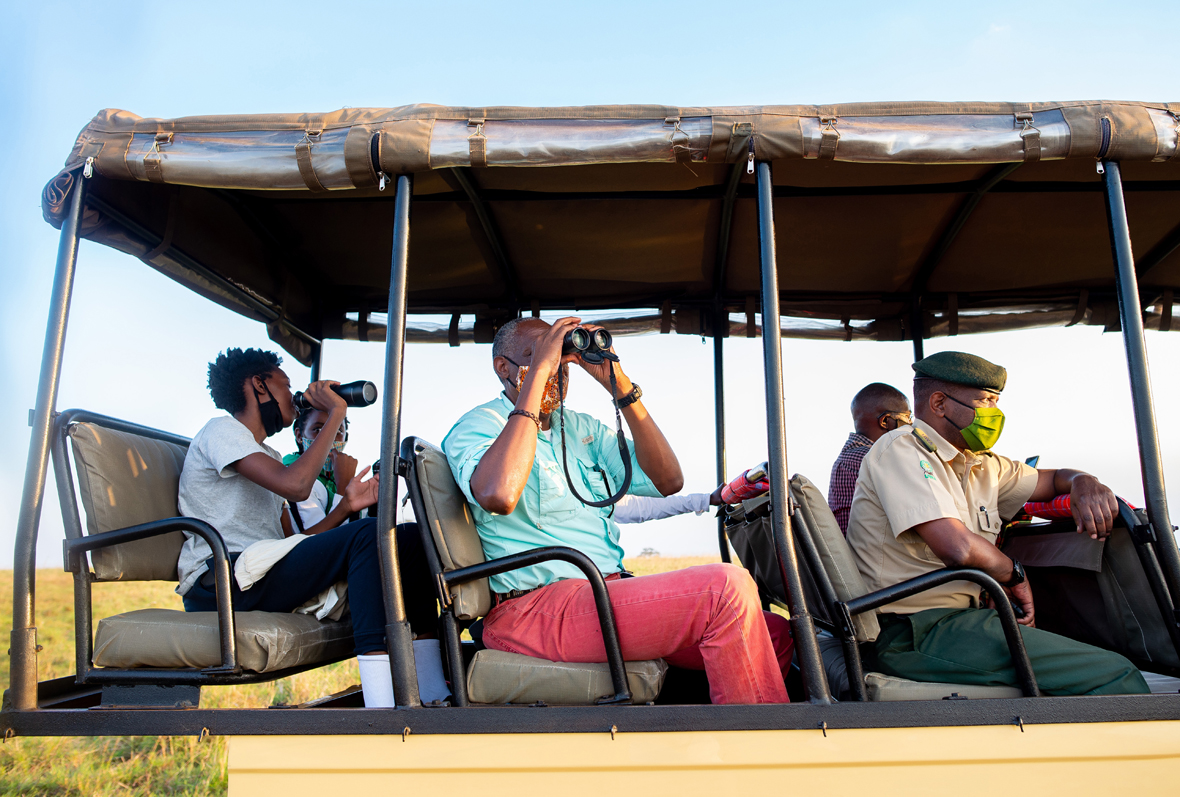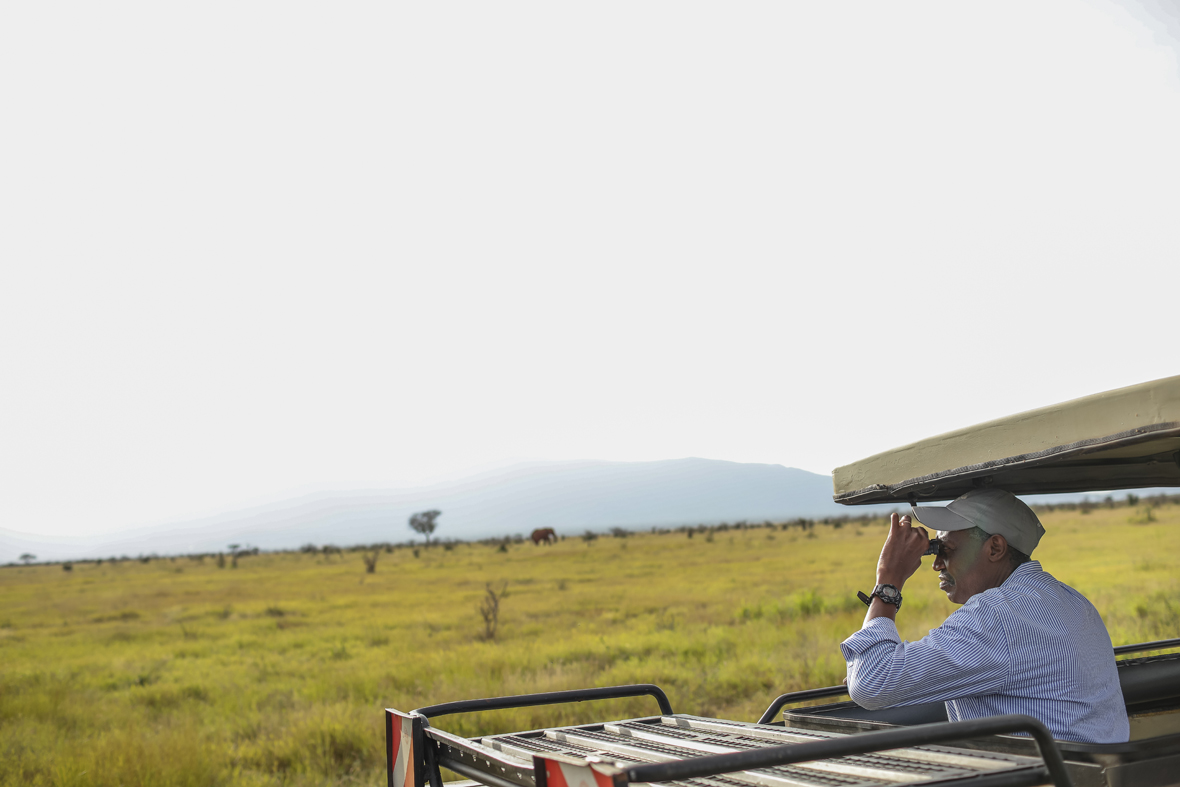Conservation and Tourism: Africa’s Keys to Unlocking a Sustainable Future

AWF CEO, Kaddu Sebunya on Safari with his family in Kidepo National Park, Uganda
Africa stands on the brink of a transformation, where tourism and conservation can become powerful engines of economic growth and sustainable development. As the world turns its gaze to Africa, recognizing its untapped potential, we must ensure that this moment is not only seized but also managed with foresight and responsibility. Our natural landscapes, wildlife, and cultural heritage are not just attractions; they are the foundations upon which we can build an inclusive and resilient future for the continent.
Tourism is already a significant contributor to Africa’s economy, generating over $170 billion annually and providing employment for 24 million people. But these numbers represent only a fraction of what is possible. With the right investments in infrastructure, skills, and policy reforms, Africa’s tourism sector could expand exponentially, creating millions of new jobs and contributing even more to GDP growth. Yet, the future of tourism in Africa cannot simply be about numbers; it must be about creating a sustainable model that benefits both people and nature.
At the heart of this transformation is conservation. Africa is home to some of the world’s most iconic wildlife and ecosystems, and these natural assets are key drivers of tourism. However, they are also under threat. Biodiversity loss, deforestation, and habitat degradation pose serious risks not only to the environment but also to the tourism industry that relies on these resources. By integrating conservation into our tourism strategies, we ensure that the sector grows in harmony with the preservation of Africa’s natural wealth.
Conservation-based tourism offers a unique opportunity for communities to benefit directly from the protection of their natural surroundings. When local people are empowered to manage and profit from conservation and tourism around protected areas, they become the stewards of their own environments. This model creates jobs, improves livelihoods, and fosters a sense of ownership over conservation efforts. It is a virtuous cycle where tourism drives conservation, and conservation sustains tourism.

Kaddu Sebunya on Safari in Tsavo National Park, Kenya
On this World Tourism Day, it is important to reflect on how Africa can capitalize on these opportunities. One key area is domestic tourism. Intra-African travel accounts for less than half of the continent’s tourism market, a figure that must grow if we are to build a resilient tourism industry. By marketing Africa’s unique attractions to Africans themselves, we can foster a sense of pride and ownership over our natural and cultural heritage. This internal market is critical, especially in times of global uncertainty, as it provides a stable foundation for the industry’s growth.
Moreover, tourism is a catalyst for broader economic development. It stimulates other sectors such as agriculture, transport, and retail, creating ripple effects throughout the economy. Rural areas, in particular, stand to benefit from tourism-driven development. Often rich in natural beauty and cultural heritage, these regions can be transformed into hubs of economic activity, attracting investment in infrastructure, creating jobs, and supporting local businesses. By connecting rural and urban economies, we can ensure that the benefits of tourism are felt across the continent.
To maximize the potential of tourism, Africa needs to focus on skill development and capacity building. The hospitality industry, which is expected to grow by 50% by 2030, requires a skilled and dynamic workforce. Training programs, apprenticeships, and partnerships with educational institutions are essential to preparing young Africans to take on leadership roles in the sector. With the right investments, Africa can build a world-class hospitality industry, where African talent is recognized globally for its excellence.
Sustainability must also be a guiding principle as Africa’s tourism sector expands. The global trend toward eco-tourism offers a significant opportunity for Africa to lead in the development of environmentally responsible travel experiences. By building eco-friendly resorts and lodges, and promoting practices that minimize environmental impact, we can attract a growing segment of tourists who are looking for sustainable travel options. Africa’s natural beauty is one of its greatest assets, and preserving it is not only a moral imperative but also a smart business strategy.
Finally, Africa’s tourism growth will depend on addressing structural challenges. Open skies agreements, streamlined visa processes, and improved airport infrastructure are essential for making travel to and within Africa more accessible. These reforms will not only increase the number of visitors but also make it easier for tourists to explore multiple destinations across the continent. Imagine an Africa where a tourist can move seamlessly from the Serengeti to the Namib Desert, experiencing the full diversity of the continent’s landscapes and cultures without the bureaucratic hurdles that currently exist.
As we look to the future, the potential of Africa’s tourism sector is clear. But realizing this potential will require bold action from governments, the private sector, and civil society. Together, we must invest in the infrastructure, skills, and policies that will enable tourism to thrive. We must also commit to conservation, ensuring that the growth of tourism does not come at the expense of Africa’s natural resources. By embracing this vision, we can create a tourism sector that is not only a major economic driver but also a force for environmental and social good.

AWF CEO, Kaddu Sebunya on Safari in Tsavo National Park, Kenya
In conclusion, Africa’s tourism future is bright, but it requires a comprehensive and sustainable approach to ensure that it benefits both people and nature. On this World Tourism Day, let us commit to working together to unlock the full potential of this dynamic industry. By prioritizing conservation, investing in our people, and addressing structural challenges, we can build a tourism sector that serves as a cornerstone of Africa’s development for generations to come.